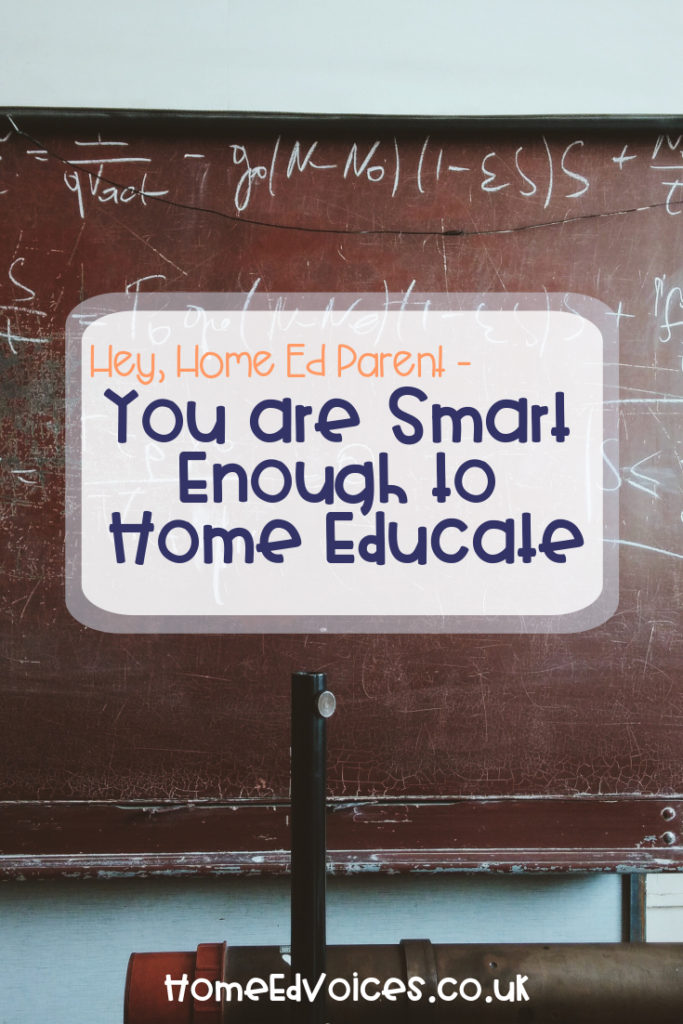You are Smart Enough to Home Educate

A relative we were visiting recently told me that she had decided it was okay that we home educate because both my husband and I have degrees, and she thinks we are both ‘very intelligent’. But that other, less intelligent people shouldn’t home educate their children. I politely disagreed and then let the subject drop.
But this idea is the start of a bigger conversation, one that is worth having here – if you want to home educate your children then you are smart enough to home educate your children.
How smart do you need to be to home educate your children?
If you want to home educate your children (or feel called, or however you want to put it) then you are smart enough to home educate your children.
If you are willing to take responsibility for you children’s education (which is your legal responsibility in the UK, regardless of how you provide it – private school, local school, or home education), then you are smart enough to home educate your children.
There are definite barriers to home education, (needing to work outside the home to pay the bills, especially for single parent families, co-parenting with someone who refuses to support home education etc) but a lack of qualifications is not one of them.
A ‘Good Education’ is a Privilege (that not everyone has access to)
A good education is a privilege, and it’s not one that everyone has. Within the school system children in the same class can have widely different experiences.
Things that can affect your ability to get a good education (in no particular order):
- an unsafe home environment
- physical, emotional or sexual abuse
- un-diagnosed mental or physical health issues
- un-diagnosed cogitative, sensory or learning difficulties
- lack of support for diagnosed mental, physical or learning difficulties (despite qualifying for assistance.)
- bullying (by teachers or other children) due to race, sexuality, ethnicity or for no discernible reason
- under-funding/under supported school
- poor/inexperienced teaching
- lack of money within the family
- homelessness
- pregnancy and lack of family support
- lack of mentoring or external support during periods of difficulty
It’s not that people who experience these things haven’t gone on to get qualifications, it’s that these things make getting a good education and good qualifications a lot harder, and future opportunities cost money in a way that not everyone can afford. (Even if you don’t have to pay for your qualifications you will have to take time away from earning opportunities to access them.)
My own experience was of picking a degree that I ended up hating, being really bad at and quit at the end of my first year. A few years later I went on to get a good degree in a subject I was really passionate about. This taught directly that often education isn’t about intelligence, it’s about how much you care about what you are learning, and the quality of your learning experience.
What makes you ‘Smart Enough’ to home educate your children?
- Caring about your children’s welfare
- wanting a good life for them
- wanting to learn together
- wanting to give them learning opportunities (many of which can be low or no cost, or are subsidized for low income families)
- wanting to take your child out of a stressful or unhappy schooling situation
- curiosity about the world
What to do if you have gaps or areas of weakness in your education?
Firstly, everyone has gaps in their education. The education you give your children will also have gaps. But that is ok. You are prioritising what you (and your children) believe to be important, and leaving things that they will discover on their own as they get older. You are building an interest in the world and a love of learning that can last a lifetime, not trying to cram all human knowledge into 13 years or so.
Secondly there are lots of options available if there are subjects, (like maths – everyone always talks about maths this way,) that you lack confidence in.
You can use an online programme to teach your child the subject, or hire a tutor (either online or in person). You can swap teaching that subject with a friend who enjoys it, or you can see yourself as a guide or mentor, rather than a teacher, and learn alongside your child. If you use a curriculum that is able to teach the material in a number of ways, you will be fine, and if you ever get stuck you can turn to other members of the community, or youtube, or google to help you figure out a way of learning that suits you.
In short:
- qualifications aren’t actually a measure of someone’s intelligence or worth
- there are barriers to education that are out of an individual’s control
- if you want to take on the responsibility of your child’s education then you are ‘smart enough’ to do that
- every education (regardless of method) has gaps
- subjects that you lack confidence guiding can be tackled in a variety of ways